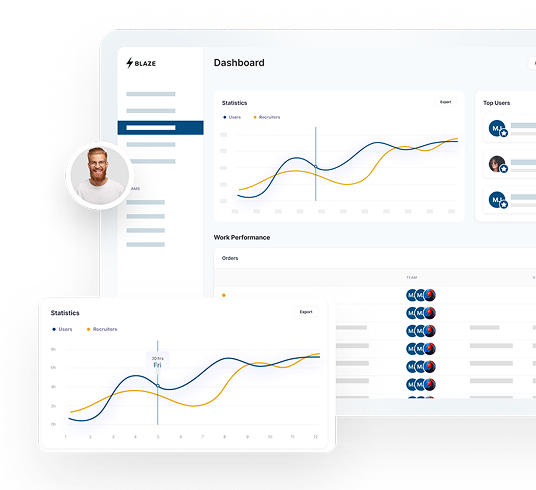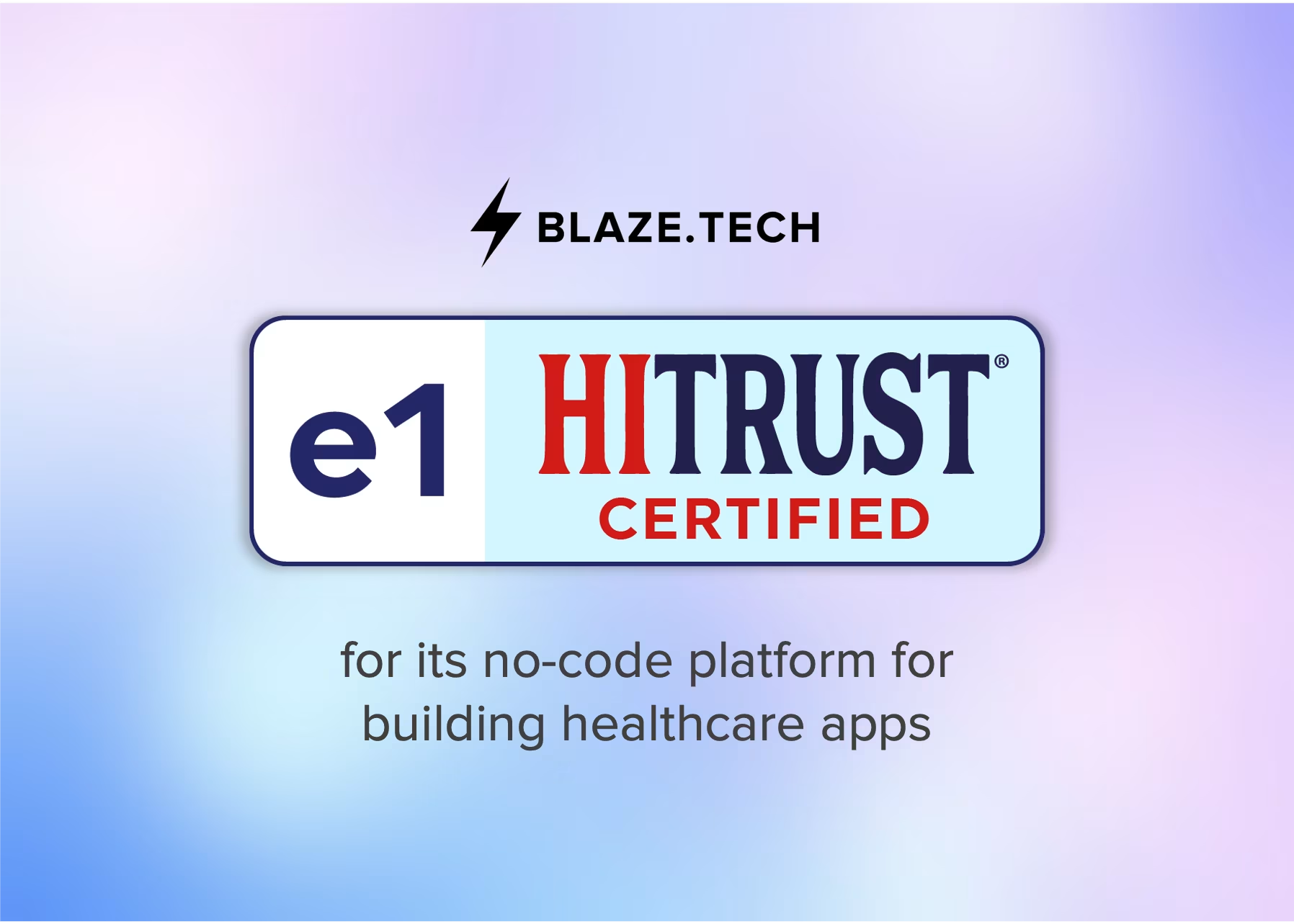Table of contents
Best 12 Ways for Managing Change in the Workplace | Blaze

Written by
Blaze Team

Reviewed by
Nanxi Liu
Expert Verified
With the beginning of the New Year, a lot of workplaces are rapidly changing. Change in the workplace can come about for a variety of reasons, including company restructuring, economic changes, and everything in between.
We’re all human. And as human beings, dealing with unexpected changes can often be very difficult. If your colleague is suddenly moved to a different team, for example, that might entirely change the way you view your experience. That’s okay and entirely understandable.
The best way to handle change is being prepared for it. In this comprehensive guide, we will discuss some of the most time-tested strategies for addressing sudden changes in the workplace. Whether a change has recently occurred in your workplace or you simply want to be prepared for when one inevitably occurs, be sure to take some time to review the helpful tips within this guide.
Common Workplace Changes
First, let’s start by recognizing that not all changes are bad. For example, if your company decides to give you a promotion, you’ll likely consider that to be a positive change.
There are also plenty of changes that are somewhat neutral. If your boss (you have relatively indifferent feelings about) is replaced by somebody else you also feel indifferently towards, it might not be a very big deal. Regardless, this change could eventually have a direct impact on your work life.
As the old cliché goes, “the only constant in the world is change.” There are seemingly countless different types of changes that can happen in your workplace. However, most of these changes will (roughly) fall into a few distinctive categories.
- Structural Changes: if the company you work for buys—or is sold to—another business, that can significantly affect your day-to-day. The changes that result from this can have a major impact on your relationship with the company, even if you’re performance has been nothing but excellent.
- Role Changes: if your role at your company ever changes—hopefully as the result of a promotion—then your entire work experience will change, as well. However, you might also be affected by other people’s roles change, especially if they are people that you directly work with.
- Tech and Operational Changes: competitive businesses will always be looking for ways to improve. The introduction of new technology might have a major impact on how you go about your job. Additionally, if the company changes its supply chains or other operations, you should also expect your workload to evolve.
- Economic Changes: no matter the size, every business is involved in the broader “economy.” That means any widespread economic changes—for better or for worse—will very likely affect your company’s overall well-being.
- Other Changes: there are countless other changes that could potentially affect your work life. For example, if the company decides to move its headquarters to another state (or even another country!), you might be asked to move as well.
No matter what happens, it will always help to be prepared. Here’s why:
The Importance of Being Prepared
As an employee, you’ve probably noticed that there are a lot of pieces of your company that you simply can’t control. You likely can’t control any M&A activity. You also probably can’t control your company’s long-term operating plan, unless you are involved in senior management.
Keeping this in mind, it’s easy to adopt a “wait and see” approach to work. However, just because you can’t control something, that doesn’t mean you should stand idly by. After all, in “real life”, you can’t control when a hurricane might take place. But you can be sure that almost everyone living in hurricane-prone regions will have a plan for what to do.
Being prepared for change means that you’ll be able to navigate future changes with greater ease. Suppose you are offered a big promotion tomorrow. What will your response be? Suppose your boss retires and is replaced by an outside hire. Do you know what you’ll do?
If you have a plan, you’ll look much more professional. You’ll also be able to navigate the fallout of changes, such as new dynamics with your coworkers. Additionally, by simply thinking about things in advance, you won’t have to worry about future uncertainties.
In other words, there is no such thing as being “too prepared”—even if your hypotheticals never actually come true.
Tips for Managing Workplace Changes
Workplace changes are going to occur. That’s a simple fact of life. Here are some of our best tips on navigating future developments:
1. Take Inventory of Your Current Role
Change is inevitable. But in order to know how future changes might affect you, it is important to understand where you stand in the status quo. Take a moment to reflect upon your current role, responsibilities, and general job dynamics. Think about the people working directly above you, directly below you, and everywhere else in the organization. Where do you see yourself five years from now? What is the path you plan to take to get there?
2. Never Stop Self-Improving
While you can’t control change, you can control the ways you are improving yourself. And when change does come, you’ll want to be sure you are in a position to move in the direction you want. Investing in personal development—such as completing an online course or learning a new skill—will put you in a position for long-term success.
3. Be Willing to Ask Questions
One of the reasons we tend to feel anxiety (whether in the workplace or anywhere else) is that we all have unanswered questions. Of course, there will always be some questions that remain unanswerable. But there are a lot of questions that can be answered. If you are worried about sudden changes, it can be beneficial to get ahead of the game. Don’t be afraid to make your voice heard and get the information you need.
4. Communicate in All Directions
When planning for the future, people tend to default to only talking to those who are directly above them (their boss). But, more times than not, there will be plenty of other people involved in your organization as well. Rather than only talking to your direct superiors about future changes, establish ties with everyone from the intern getting you coffee to even the CEO.
5. Be Willing to Be Flexible
When a sudden change occurs, it can be very easy to overreact. We all do it. But a lot of times, if you zoom out a bit, this change will seem relatively small. Rather than throwing in the towel when a new challenge approaches, take a step back and take a deep breath. If you’re willing to be flexible, then you’ll be more likely to end up where you want to be.
6. Find an Outside Confidant
While communicating with all levels of your company will be beneficial, you still need to be mindful of what you say. This is especially true if you are the type of person that tends to react dramatically to unforeseen news. Rather than venting to people within the company—who are also affected by these sudden changes—try to find an outside confidant. Whether it’s a friend or a family member, this can help you avoid letting your emotions get the best of you in the workplace.
7. Forecast Possible Changes
While there will always be some changes that will take you completely by surprise, there are also some that you can prepare for. And when you can prepare for change, accepting that change will be much easier. Start by simply watching the news and following internal developments. Put yourself in the shoes of the CEO and ask yourself: what is your next big move?
8. Do Your Best to Stand Out
It’s easy to try to keep coasting. This is especially true if you’ve been working in your current role for a while and feel that your job is secure. But putting in just a little bit more effort will help you thrive when future changes occur. Show up a little early. Leave a little late. Make sure to give your best in everything you do, even when you’re feeling exhausted and might not get credit.
9. Suggest Your Own Positive Changes
Very few companies will have just one decision-maker. Even if your company has a rigid hierarchy, that doesn’t mean you can’t have input. If you want to see a specific change—no matter how big or small that change might be—do what you can to make sure your ideas get heard. If anything, the key decision-makers will be impressed with your initiative. For example, if there's a process or operation that can be improved with software, you can build it without needing engineers by using Blaze. Build things like custom inventory management or automated workflows.
10. Understand Why Change Occurs
Most changes don’t happen for no reason. Organizational changes are usually a reaction to some sort of external event. For example, if a company has a terrible quarter and the economy is doing poorly, layoffs might occur. At the same time, a positive quarter could result in bonuses and promotions across the board. Spending a little bit of time to learn about the dynamics of your company will always be worthwhile.
11. Don’t Be Afraid to Move On
Workplace anxiety is common. A lot of workers, at all levels, tend to think, “I don’t know what I’d do if X, Y, Z happened.” And they let that thought affect their everyday well-being. But it doesn’t have to be that way. In fact, simply thinking, “if things change in the wrong direction, I can always find opportunities elsewhere.” While there are a lot of things to consider before leaving your position, knowing that leaving is even possible can bring some much-needed relief. This is especially true in the current hiring climate, where many businesses are understaffed.
12. Maintain a Positive Mental Attitude
Work is stressful. Change is stressful. And when change occurs at work, the stress can increase even more! But no matter what happens in the workplace, maintaining a positive mental attitude is something that will always be beneficial. What “PMA” means for a given person will vary. But taking deep breaths, even meditating, and looking at the larger picture might cause some of the apparently insurmountable problems you face to become less of a big deal. That matters.
Conclusion
No matter what kind of company you work at, change is going to occur. We all know this. At this point, all we can do is prepare in advance. And while preparing for—as well as addressing—future changes might not always be easy, keeping these helpful tips in mind can help make your life easier and prepare you to thrive.
Build tools that help you prepare for changes in the workplace with Blaze.tech.
The Secure No-Code & AI Platform
Supercharge your team's operations and performance with better apps and tools.
Create custom apps fast
Secure & HIPAA compliant
Streamline complex workflows

The Secure No-Code Platform
Build apps with best-in-class security.


